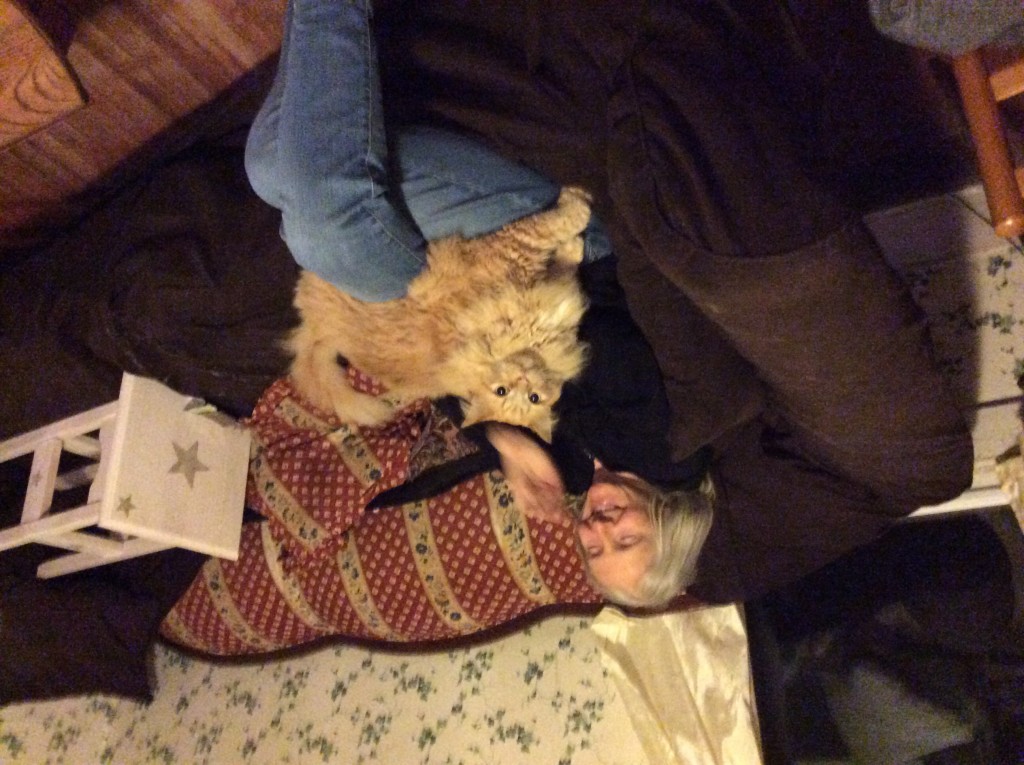While practicing the fourth movement for the American Discovery project tears started to well up. This was the movement I composed while we were hiking the Pacific Crest Trail, thus the most likely to cause tears. To hold them back I invoked an image of Cindy lying down in the leaves, looking up and laughing as I scoop more leaves on her. This tactic worked and I continued to practice.
Given the context as reported in my previous blog post, this image would seem to be a poor tactic for calming myself. The image could invoke the tragedy of Cindy’s continual decline, rather than the inspiration of laughter in the face of that decline. Yet in the distinction between what counts as tragedy or inspiration lies the key for coping with Alzheimer’s.
I am not advocating denial as a coping strategy. Denial of a family problem contributed to Cindy’s decline. I acknowledge the tragedy in early onset Alzheimer’s; by accepting Cindy’s condition as tragic I can fully appreciate the inspiration she provides.
I also acknowledge that the type of patient matters for a caregiver coping with Alzheimer’s. A person who has lived a miserable life likely will be miserable, even violent, when afflicted with Alzheimer’s. On the other hand, a person filled with warmth and good memories can provide joy to a caregiver. In either case we should provide warmth to our loved ones with the expectation of warmth in return. You might not have an endearing patient regardless, but you certainly will not unless you cultivate and expect warmth.
The tragedy of an illness lies in what was and what no longer can be. Maybe this sounds counterintuitive, but to cope with a tragedy like Alzhiemer’s we must be focused on the present. Sure, I’m proud of who my “Expedition Woman” was, but all my inspiration these days comes from what happens in the present moment, from the person Cindy is, not was, as she deals with her affliction.
Acceptance, warmth and living in the present, along with any other coping mechanism, are undermined in our society because of stress. Stress can make even a person with the heart of a saint become meaner. To that end I offer four other coping mechanisms as a first priority.
Live an unhurried life. Much of worry comes from hurry. This may mean, as a caregiver, you indeed need to “quit your day job.” I have big ideas and big ambitions, including some that will even draw income (lol). I work on these ideas when I can, but otherwise I am a full time caregiver, with nothing scheduled in my life but to provide care.
Stress is still a threat to the caregiver when no longer earning income because of financial worry. My means of reducing this worry is to live simply. The more expensive your lifestyle the more worried you will be about jeopardizing that lifestyle as a caregiver …. or any other endeavor besides earning income. People often wondered how we could go on long distance hikes, assuming we must be independently wealthy. No; just the opposite. We did not sacrifice as much through the inexpensive activity of hiking as does a person accustomed to earning and/or spending more. Just so, the financial worry from my role as dedicated caregiver has been reduced from living simply.
A support network can help reduce a caregiver’s stress. Support from others depends on the caregiver involved. In my case I draw support from the followers of this blog, along with the support of small town neighbors and friends. I realize the more urban or suburban your situation, the less available are these informal channels of support. There are organized support groups on the web and in your own community that you can find readily enough by Googling. I provide links to some of these.
Stress is the most important health risk factor, but a caregiver should be attuned to all other health factors as well. Stress can undermine health, while poor health can lead to stress, thus creating a vicious cycle. You can refer to the “Brain Health” menu for advice on how to promote brain health for both caregiver and patient.
This lays out a chain of factors for coping with Alzheimer’s. Through an unhurried and unworried lifestyle, with good health and a support network, can caregiver stress be reduced. Through reduced stress can the caregiver live in the present moment, nurturing warmth and acceptance. Through a climate of warmth and acceptance in the present moment can a caregiver draw inspiration from what many may view as tragedy. One can focus on the laughter after a fall, rather than the fall itself.
Yes, this is a good strategy for coping with Alzheimer’s, as well as with life.

